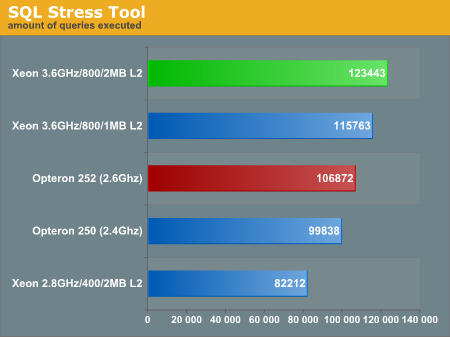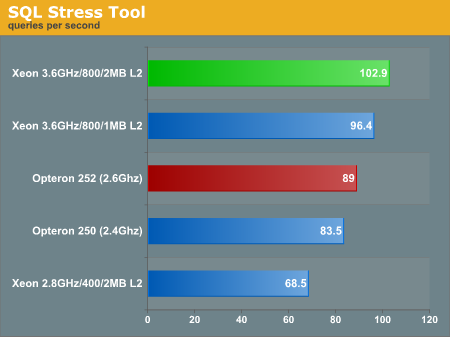Intel Xeon 3.6 2MB vs AMD Opteron 252 Database Test
by Jason Clark & Ross Whitehead on February 14, 2005 8:00 AM EST- Posted in
- IT Computing
SQL Stress Results
The SQL Stress results have changed somewhat from some of our earlier articles using this tool. We did a revamp of the tool itself, which is more performant on high volume queries. Also, we lengthened the test time to 20 minutes and changed the queries around some to reflect our current FuseTalk version. The new 2MB L2 Xeon part did quite well here, churning out a 7% gain over its 1MB counterpart. The Opteron 252 gained its usual 7% for its clock increase of 200MHz. There was no gain from the 1GHz HT link support as we discussed in our Test Hardware configuration on Page 2. Overall, the new Xeon 2MB part was the "hands down" winner for this test with a 13% lead over the Opteron 252, thanks to its 1MB cache boost.
Total queries executed
The number of queries that were executed throughout the duration of the test.
Queries per second
An average of how many queries per second were executed throughout the duration of the test.












97 Comments
View All Comments
Hans Maulwurf - Wednesday, February 16, 2005 - link
Yes, but IBM would not use memory that is not on the recommanded list of the mainboard, at lest I hope so.And it is possible that the boad sets very high latencies for the memory you used. So I think it is an important information especially when using memory that is not recommanded.
Jason Clark - Wednesday, February 16, 2005 - link
Hans, let me ask you this. When someone in an IT dept. calls Compaq, Dell, HP or IBM for a server do you think they ask them what the memory timings are set at? The answer is no. Which is why we aren't going to provide information like that, as it isn't relevant to the target audience or the purpose of the article. We're trying to educate the IT folks on what platform does what on certain workloads and IT related tests.Cheers.
prd00 - Wednesday, February 16, 2005 - link
Hans Maulwurf - Wednesday, February 16, 2005 - link
Jason,you do not have to play with the memory timings to report them.
dm - Tuesday, February 15, 2005 - link
danidentity, i guess you're right when you mentioned about 5pages of reply ;)...prd00 - Tuesday, February 15, 2005 - link
Sorry, missed your comment Jason.. I read viditor comment that said as single. So, in Dual setup, Xeon is more powerful now ;). Then, Xeon must be faster in single.I am waiting for 64 bit one ;)
prd00 - Tuesday, February 15, 2005 - link
Wow.. single??On single setup, I already knew that Xeon is powerful. Right now what we are lacking is a TRUE SERVER BENCHMARK. Not just single vs single. I can safely recommend Xeon since a few months ago on single setup, but right now, most of our customers are asking about DUAL SETUP. Some are looking in QUAD setup. Single is useless in server environment. For databse server, 9 out of 10 are looking for 2p setup
So, what I am really looking are database benchmark on single, dual and quad setup, and also how does it scale. Which platform best suited for 2p and 4p, and which one has better upgrade future (i.e. by adding processors), and until what point.
So, like, Xeon is good for 1p, but on 2p Opteron is better, while more than 8p we can consider Itanium instead for database server.
Kind of conclusion like that.
Jason Clark - Tuesday, February 15, 2005 - link
Zebo, because this is a server test. You don't play with memory timings/overclocking in servers. We used default memory timings that the Tyan board set for the memory. I linked to the manufacturer specs on the memory which identifies its SPD rating. The only thing we're investigating at this point is the 1GHz HT issue in the bios.PrinceGaz - Tuesday, February 15, 2005 - link
It's certainly a change from the usual Opteron beating Xeon in almost all server tests reviews, and all the more so because you say they were both dual CPU systems (I was under the impression while reading they were only single CPU servers being compared).It just goes to show how much difference the benchmarks that are run, how well the systems are set up, and any other things we never know about, can influence results.
I'm glad Intel is coming out ahead in some tests on AT, maybe you should make them come out ahead on desktop stuff too as that might encourage AMD to drop the prices on the higher rated E0 revision Athlon 64 processors sooner rather than later :)
Zebo - Tuesday, February 15, 2005 - link
Jason how comw you did'nt say mem timings nor speed or if 1T or not? I've never seen a review from AT without this.